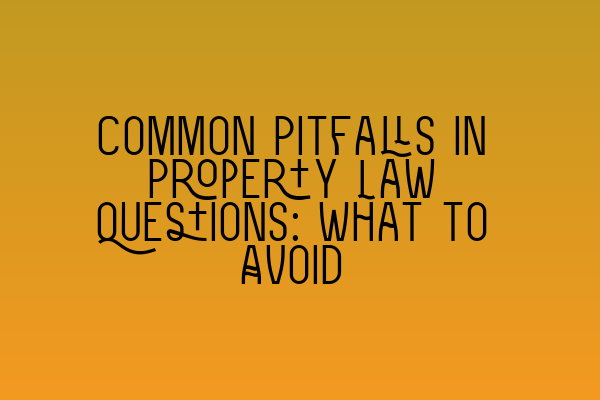Common Pitfalls in Property Law Questions: What to Avoid
As a solicitor specializing in property law, I have encountered numerous challenges and pitfalls that students and professionals often face when dealing with property law questions. In this blog post, I will highlight some of these common pitfalls and provide valuable insights on what to avoid. Whether you are a law student preparing for the SQE exams or a practicing solicitor looking to expand your knowledge, understanding these common pitfalls will help you navigate property law questions more effectively.
1. Failing to Identify the Relevant Legal Principles:
One of the most common mistakes in property law questions is not identifying and applying the correct legal principles. It is crucial to carefully read and analyze the question to determine which legal principles are relevant. This includes understanding the relevant statutory provisions, case law, and any applicable principles of equity. By conducting thorough research and referencing reputable sources, such as textbooks and legal journals, you can ensure that your answers are based on accurate legal principles.
To test your knowledge on relevant legal principles, you can practice with SQE 1 Practice Exam Questions.
2. Ignoring the Importance of Land Registration:
Land registration is a vital aspect of property law that should never be ignored. It is essential to understand the different types of land registration systems, such as the registered and unregistered land systems, and how they impact property rights and transactions. Forgetting to consider the implications of land registration can result in incorrect answers and a misunderstanding of the overall legal framework.
To enhance your understanding of land registration, you can explore SQE 2 Preparation Courses.
3. Neglecting to Address the Practical Implications:
While it is crucial to have a solid grasp of the legal principles, it is equally important to consider the practical implications of property law questions. Property law often involves real-life scenarios and transactions, and it is essential to apply the legal principles to these practical situations. For example, when answering questions on leases, you should consider issues such as rent collection, repair obligations, and dealing with breaches of lease terms.
To strengthen your practical application skills, you can benefit from SQE 1 Preparation Courses.
4. Overcomplicating the Answer:
Property law questions can sometimes be complex, but it is important to avoid overcomplicating your answers. Avoid using excessively technical language or convoluted explanations that may confuse the reader. Instead, strive to provide clear and concise answers that address the question directly. Remember to support your answers with relevant legal authorities, such as case law and statutes, while keeping your response easy to understand.
To assess your ability to provide clear and concise answers, you can practice with SQE 1 Practice Mocks FLK1 FLK2.
5. Failing to Keep Updated with Changes in Property Law:
Property law is constantly evolving, with new legislation and case law shaping its landscape. Failing to keep updated with these changes can be a significant stumbling block when answering property law questions. Make sure to stay informed about recent developments and important judgments that may impact property law principles. Regularly reading legal updates, attending seminars, and engaging in professional development activities will help you stay on top of these changes.
To stay informed about the latest property law updates, you can refer to SRA SQE Exam Dates.
In conclusion, by avoiding these common pitfalls and implementing the strategies outlined above, you can approach property law questions with greater confidence and accuracy. Remember to identify the relevant legal principles, consider the implications of land registration, address the practical aspects, provide clear and concise answers, and stay updated with changes in property law. By doing so, you will enhance your skills, improve your examination performance, and become a more proficient property law practitioner.
I hope you found this blog post insightful and helpful in your journey to master property law. Should you have any further questions or require additional support, do not hesitate to contact the team at SQE Property Law & Land Law.
